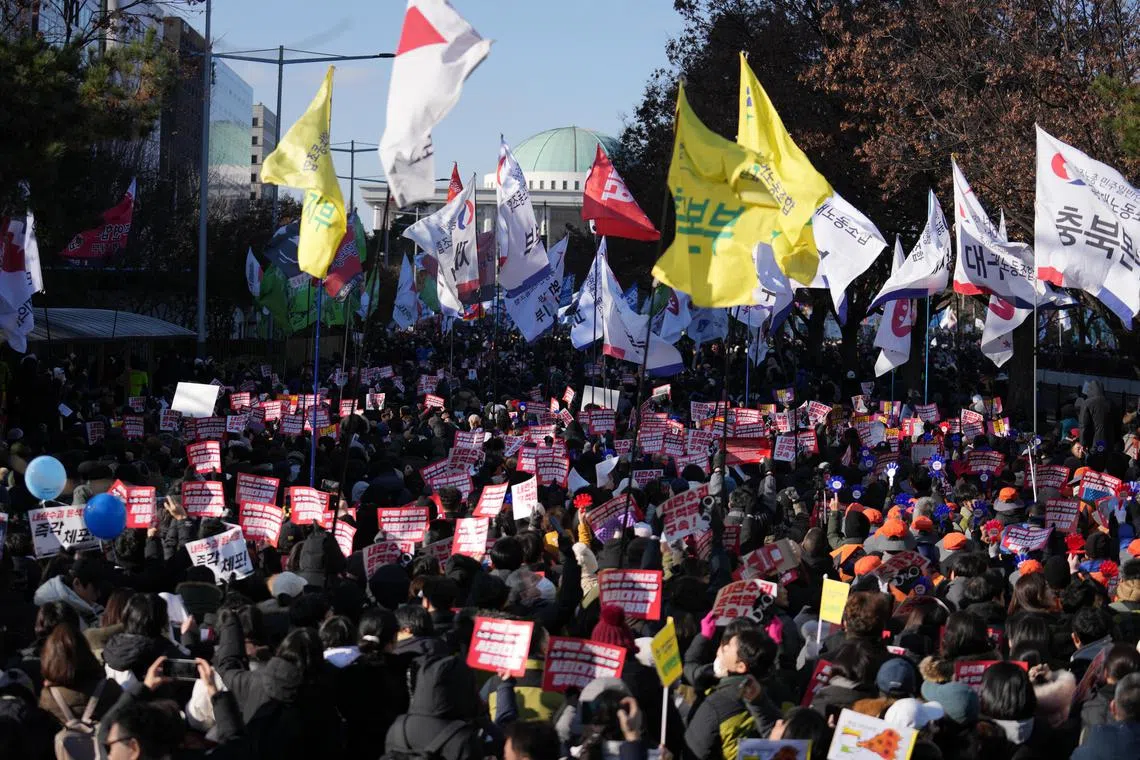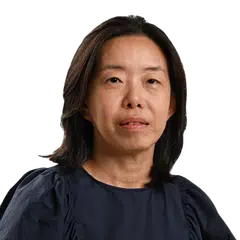South Korean opposition to propose new impeachment Bill after bid to impeach President Yoon fails
Sign up now: Get insights on Asia's fast-moving developments

Demonstrators calling for the impeachment of President Yoon Suk Yeol outside the National Assembly in Seoul on Dec 7.
PHOTO: NYTIMES
Follow topic:
SEOUL – South Korean President Yoon Suk Yeol has managed to cling on to power for now, after an impeachment motion against him over the Dec 3 martial law debacle
Tabled by the 192-member opposition bloc for voting on Dec 7, the motion needed eight more votes from ruling party lawmakers to meet the 200-vote quorum. But the motion fell short
All but three of the 108 ruling People Power Party (PPP) lawmakers boycotted the vote. They were determined to prevent Mr Yoon from being impeached as it would mean a snap presidential election, which the PPP would most likely lose.
Opposition leader Lee Jae-myung, who lost to Mr Yoon by a sliver of a margin in 2022, is widely tipped to win if a snap election is called.
The opposition Democratic Party of Korea said it will propose a new impeachment Bill against Mr Yoon on Dec 11, which will be put to a vote on Dec 14.
Two Bills were tabled on Dec 7, the first being a special counsel investigation into corruption allegations surrounding First Lady Kim Keon Hee, and the second was Mr Yoon’s impeachment.
PPP lawmakers were seen leaving the plenary hall after voting on the first motion, evidently to abstain from voting on the impeachment motion.
The PPP lawmakers’ departure prompted Speaker Woo Won-shik to declare in exasperation: “How do you think the people, the world, and history will view you not voting on the unjust martial law and its aftermath? Aren’t you afraid of the judgment of history? Aren’t you afraid of the judgment of the people? Aren’t you afraid of the judgment of the world?”
The Speaker made repeated calls for their return, and eventually three returned to applause from the floor.
Mr Ahn Cheol-soo, a three-time presidential candidate, and Ms Kim Ye-ji, a visually impaired politician, had previously indicated they would vote for the impeachment, given the strong public sentiment against the six-hour brush with martial rule.
Mr Kim Sang-wook disappointed the opposition members who had cheered his return to the session, when he revealed that he had voted against the motion, as per party stance.
Speaker Woo, who declared the plenary session closed at 9.20pm (8.20pm Singapore time), more than four hours after it began, told the floor it was regrettable that Parliament was unable to adhere to the “democratic process on a matter of national importance”, and apologised to the nation on behalf of the National Assembly.
Under South Korean Constitution, the Bill could have been open for 72 hours after it was tabled at 12.48am on Dec 5, which meant the National Assembly could have waited till 12.48am on Dec 8.
But by 9pm, it was clear that the PPP lawmakers – holed up in another part of the building, supposedly for a party general meeting – were not coming back.
Earlier, the Bill for a special counsel probe into Ms Kim’s alleged stock manipulation, election interference and leaking of classified information, failed to pass by two votes.
The Bill against Ms Kim had been pushed through three times before, but were vetoed by President Yoon each time, most recently on Nov 26.
Following the failed impeachment bid, an outraged Mr Lee, leader of the Democratic Party, criticised the PPP as a “criminal party that has betrayed the country”.
Having earlier vowed to repeat the impeachment process until successful, Mr Lee pledged that he would not give up and would “normalise the country” by the end of the year.
Nearly 150,000 upset South Koreans had thronged the boulevard outside the National Assembly, calling for the impeachment and arrest of Mr Yoon, while about 20,000 supporters of the conservative PPP gathered at Gwanghwamun in central Seoul, about a 20-minute drive away.
Protests were also held in other parts of the country, like Gwangju, where a violent uprising in May 1980 resulted in more than a thousand deaths.
The uprising was during the country’s last period of martial rule from October 1979 to January 1982, until Mr Yoon’s late-night declaration of martial law on Dec 3 threw the nation into a tailspin and dredged up painful memories.
Kyung Hee University’s political scientist Ahn Byong-jin was among those at the National Assembly protest on Dec 3. The 57-year-old, who was jailed briefly in 1990 for student activism under the rule of then-president Roh Tae-woo, said that as “a Korean citizen, I must express my anger”.
The late president Roh was an army general before becoming president from 1988 to 1993. In 1996, he was found guilty of his involvement in the Gwangju massacre and sentenced to 17 years in prison but later received a pardon.
Professor Ahn described the Dec 7 impeachment failure as “the end of the story”. He said the next round of impeachment motion will not pass muster, as the opposition is unlikely to get the critical eight votes from the PPP, since party chief Han Dong-hoon has decided to block the impeachment.
Mr Han had earlier flip-flopped, stating on Dec 5 that his party would block the impeachment, before declaring the very next day that Mr Yoon needed to be suspended from his presidential duties immediately
He appeared to have softened his stance again after meeting the President on Dec 6, when Mr Yoon denied ordering the arrest of key politicians, including Mr Han.
After three days of lying low, Mr Yoon finally apologised to the nation
In addition to plummeting approval ratings, Mr Yoon’s presidency has been plagued by repeated pushes by the opposition for legal action against his wife, and his policies have been blocked at every turn by the opposition-dominated National Assembly.
Mr Yoon was said to be particularly incensed by the opposition’s 22 impeachment motions against his officials during his term, in particular the latest impeachment motions against the state auditor and three prosecutors, which provoked him to declare martial law on Dec 3.
The impeachments against the four high-ranking officials were ultimately passed on Dec 5.
In his apology, Mr Yoon also promised to entrust his power to the PPP to stabilise the political situation and “take responsibility for future state affairs”.
Dr Bong Young-shik of Yonsei University in Seoul slammed Mr Yoon’s two-minute apology as “insincere and shorter than the time it takes to cook ramyeon (Korean instant noodles)”.
“Mr Yoon only said that he would work with his party, without mentioning the National Assembly or the opposition. But they are all stakeholders (in policymaking). So this apology is just superficial.”
While PPP leader Han assured the public after the failed impeachment attempt that Mr Yoon would effectively be suspended from duties until he steps down, Dr Bong is convinced it is just an attempt on the part of the PPP to buy time until political rival, Mr Lee, is knocked out of the running.
Mr Lee faces possible disqualification as a presidential candidate, after being found guilty on Nov 15 by the Seoul Central District Court of lying about corruption allegations during his 2022 presidential campaign.
He was sentenced to a year in prison, suspended for two years.
His appeal is due to be heard at the Supreme Court within the next six months. If the guilty ruling is upheld, Mr Lee will not be able to run for president.

The sentiment of the protesters on the ground as “very passionate”, similar to demonstrations during former president Park Geun-hye’s impeachment in late 2016, says a political scientist.
PHOTO: NYTIMES
With him out of the picture, the PPP would be able to repair some damage and field candidates like Mr Han, who garnered 11 per cent in a presidential preference poll of 1,000 respondents released on Dec 6. Mr Lee was most favoured at 29 per cent.
Referring to the PPP’s calculus, Dr Bong quipped: “Between national interest and party interest, the latter will prevail.”
He predicted that the political stalemate will remain “for a very long time”, with South Korea’s economy likely to take a huge hit from the instability.
As for Prof Ahn, he believes that the power of the people will ultimately prevail.
Describing the sentiment of the protesters on the ground as “very passionate”, similar to demonstrations during former president Park Geun-hye’s impeachment in late 2016, Prof Ahn said he was surprised to see the younger crowd more outraged than he was.
“The younger generation are so angry that they will not give up (on removing Mr Yoon from office) so easily. Eventually Yoon and his faction, they will suffer a very severe punishment. But until that time, we are going to go through a very difficult time.”


